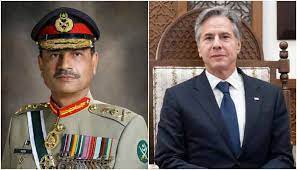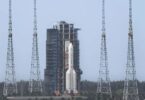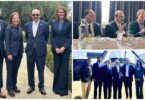Chief of Army Staff (COAS) Gen Syed Asim Munir is currently on an official trip to the United States, where the Army Chief held delegation-level talks with senior government and military leaders including Secretary of State Antony J. Blinken, Secretary of Defence Gen (R) Llyod J. Austin, Deputy Secretary of State Victoria Nuland, Deputy National Security Adviser Jonathan Finer and Chairman of Joint Chiefs of Staff Gen Charles Q. Brown.
During this high-level interaction between the two nations, several matters of bilateral interests, global and regional security issues, and ongoing conflicts were discussed by the visiting dignitaries with the senior leadership of the host nation. Both sides underscored the importance of understanding each other’s perspectives on regional security issues and developments affecting strategic stability in South Asia and identified counter-terrorism and defence collaboration as core areas of cooperation between long-held allies.
The visit of Pakistan’s Army Chief General Asim Munir comes at a crucial period in respect of bilateral relations between Islamabad and Washington and the regional geostrategic environment particularly in the context of Afghanistan which has almost slid into the pre-9/11 situations, nearly in two and a half years after US troops withdrew from the country. Meanwhile, the surge of terrorism ramped up into Northwestern parts of Pakistan adjoining boundaries with Taliban-ruled Afghanistan, on which Islamabad boosted its pressure not to allow the terrorist outfits to use its soil to plan and launch terrorist attacks into Pakistan.
The Pakistani Security Forces have launched a countrywide Intelligence Based Counterterrorism Operation against terrorist groups, who are currently on the run, trying to hold their feet by creating fear and harassment among the masses through brutal acts of terrorism against innocent public and the LEAs. Although, Pakistan-US relations witnessed a swift backlash during the tenure of the PTI government because of its pro-Taliban approach and PTI’s Chairman’s accusation against the United States for its alleged role in his ouster from power. However, the important working relationship and cooperation against terrorism had always remained in place between the two countries throughout the past.
The current regional geopolitical situation, particularly the revival of terrorism in Pakistan, the growing risk of IS-K, the congregation of terror outfits in neighbouring Afghanistan and an increased tension between Pakistan and Afghanistan has specifically aligned the Pak- US strategic interests at this point.
Historically, Washington views Pakistani military leadership as a power hub and credible ally than the civilian governments, therefore, Pak-US military to military ties have always remained warm and kinetic through all the ups and downs between the two nations. There had been a wide-ranging consensus among the intelligentsia and scholarly circles about the ever-deepening need, the desire for security cooperation and a joint Counter Terrorism campaign between the two nations in the context of growing terrorism risk in the AfPak region. Interestingly, the terror outfits are aware of the growing consensus between the two countries and the recent deadly terrorist attack in DI Khan had served as a message to potential allies.
In the current scenario, the Pak-US teamwork has historically and increasingly become important for ensuring regional stability, security, and economic progress in the South Asia region. Despite diverging interests in certain avenues at the global level, Pakistan and the United States have tremendous scopes for mutual cooperation in multiple domains particularly trade and investment, renewable energy, education, science and technology, defense and security, counter-terrorism and organized transnational crimes.
Both countries agree to promote and expand their bilateral ties along with continuing to collaborate with the global community to bring about peace, development, & stability in Afghanistan. Hopefully, the Pak-US teamwork would be able to achieve shared interests alongside promoting peace and ensuring economic revival and prosperity in the broader South Asian region.







